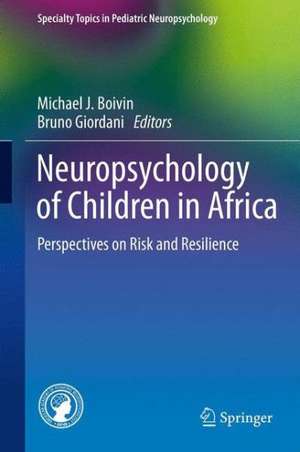Neuropsychology of Children in Africa: Perspectives on Risk and Resilience: Specialty Topics in Pediatric Neuropsychology
Editat de Michael J. Boivin, Bruno Giordanien Limba Engleză Hardback – 10 mai 2013
- Assessment of very young children in Africa in the context of HIV.
- Psychosocial aspects of malnutrition among African children.
- Assessment of neuropsychological outcomes in pediatric severe malaria.
- Neurodisability screening using the Ten Questions questionnaire.
- The neuropsychology of sickle cell disease in West African children.
- Computerized Cognitive Rehabilitation Thera
As a guide to current findings or a springboard for new studies, Neuropsychology of Children in Africa is a necessary reference for researchers, policymakers, and diverse professionals in global aid organizations, and across the discipline.
| Toate formatele și edițiile | Preț | Express |
|---|---|---|
| Paperback (1) | 643.84 lei 6-8 săpt. | |
| Springer – 15 iun 2015 | 643.84 lei 6-8 săpt. | |
| Hardback (1) | 648.24 lei 6-8 săpt. | |
| Springer – 10 mai 2013 | 648.24 lei 6-8 săpt. |
Preț: 648.24 lei
Preț vechi: 762.64 lei
-15% Nou
Puncte Express: 972
Preț estimativ în valută:
124.05€ • 134.71$ • 104.21£
124.05€ • 134.71$ • 104.21£
Carte tipărită la comandă
Livrare economică 23 aprilie-07 mai
Preluare comenzi: 021 569.72.76
Specificații
ISBN-13: 9781461468332
ISBN-10: 1461468337
Pagini: 368
Ilustrații: XX, 347 p.
Dimensiuni: 155 x 235 x 24 mm
Greutate: 0.64 kg
Ediția:2013
Editura: Springer
Colecția Springer
Seria Specialty Topics in Pediatric Neuropsychology
Locul publicării:New York, NY, United States
ISBN-10: 1461468337
Pagini: 368
Ilustrații: XX, 347 p.
Dimensiuni: 155 x 235 x 24 mm
Greutate: 0.64 kg
Ediția:2013
Editura: Springer
Colecția Springer
Seria Specialty Topics in Pediatric Neuropsychology
Locul publicării:New York, NY, United States
Public țintă
ResearchCuprins
1.Introduction: The Neuropsychology of African Children within a Co-Constructivist Paradigm.- 2.Approaches to Assessment of Very Young Children in Africa in the Context of HIV.- 3.Acknowledging Methodological Complexity in Assessing Children in HIV-affected Communities in KwaZulu-Natal Province, South Africa.- 4.Cognitive, Motor and Behavioral Development of Orphans of HIV/AIDS in Institutional Contexts.- 5.Factors Contributing to the Psychosocial Adjustment of Ugandan Preschool Children with HIV/AIDS.- 6.Examining the Psychosocial Adjustment and School Performance of Ugandan Children with HIV/ AIDs.- 7.Screening for Neurodisability in Low-Resource Settings Using the Ten Questions Questionnaire.- 8.Language Development in sub-Saharan Africa.- 9.Psychosocial Aspects of Malnutrition among African Children: Antecedents, Consequences, and Interventions.- 10.Assessing the Effects of Maternal Anemia on Child Development in Benin.- 11.The Assessment of Skill learning in African Children.- 12.The Assessment of Neuropsychological Outcomes in Pediatric Severe Malaria.- 13.Computerized Cognitive Rehabilitation Therapy (CCRT) for African Children: Evidence for Neuropsychological Benefit and Future Directions.- 14.Measurement of cognitive outcomes of at-risk children using Novelty Processing in rural Kenyan children.- 15.The Neuropsychology of Sickle cell Disease in West African Children.- 16.Postscript: Towards a Universal Brain/Behavior Omnibus in the Neuropsychology of African Children.
Recenzii
“A welcomed introduction to the landscape of pediatric neuropsychology in Africa and significantly expands the range of cultures and conditions included in most academic texts on cross-cultural neuropsychology. … The text will likely be most attractive to brain-related practitioners and educators who work in the referenced regions as well as scientists who are confronting similar challenges in other resource-limited settings. … of great interest to trainees and aid in providing a global perspective to the practice of neuropsychology.” (Desiree Byrd, Archives and Clinical Neuropsychology, Vol. 30 (5), August, 2015)
Notă biografică
Michael J. Boivin is Associate Professor in the International Neurologic and Psychiatric Epidemiology Program at Michigan State University and an adjunct research investigator with the Neuropsychology Section at the University of Michigan. A former Fulbright research scholar to the DR Congo (1990-91) and Uganda (2003-04), he presently helps lead NIH-sponsored studies in Uganda pertaining to the neurocognitive effects of HIV subtype in children, the neurodevelopmental benefits of caregiver training to enrich the home environment of very young children with HIV, and factors affecting neurocognitive disability in rural Ugandan children affected by HIV. Over the past 20 years Dr. Boivin has pioneered the application of neuropsychological assessment to gauging the neurocognitive impact of public health risk factors and interventions in African children.
Bruno Giordani is Professor in Psychiatry and Psychology and Director of the Neuropsychology Section and Alzheimer’s Disease Research Core at the University of Michigan. He is a licensed clinical psychologist and Fellow in Division 40, Clinical Neuropsychology, of the American Psychological Association. Most recently, Drs. Giordani and Boivin worked together in Uganda working with research personnel at Makerere University in order to develop the infrastructure and pilot data for the computerized cognitive rehabilitation of children surviving severe malaria and children with HIV.
Bruno Giordani is Professor in Psychiatry and Psychology and Director of the Neuropsychology Section and Alzheimer’s Disease Research Core at the University of Michigan. He is a licensed clinical psychologist and Fellow in Division 40, Clinical Neuropsychology, of the American Psychological Association. Most recently, Drs. Giordani and Boivin worked together in Uganda working with research personnel at Makerere University in order to develop the infrastructure and pilot data for the computerized cognitive rehabilitation of children surviving severe malaria and children with HIV.
Textul de pe ultima copertă
Increasingly, global humanitarian efforts are focusing on improving the lives of children. And among the developing world, the African nations are particularly affected by extreme weather conditions, devastating pandemics, and armed conflict. Neurocognitive science offers significant avenues toward bringing needed aid to the continent while creating a template for helping children worldwide.
The studies in Neuropsychology of Children in Africa clearly illustrate how the brain develops and adjusts in the face of adversity. Contributors span assessment approaches and public health risk factors, and represent established topics and emerging lines of research, including biocultural constructs and genomic technologies. Together, these chapters argue for methodology that is culturally sensitive, scientifically rigorous, consistent, and sustainable. And although the focus is pediatric, the book takes a lifespan approach to prevention and intervention, modeling a universal framework for understanding neurocognitive development. Included in the coverage:
As a guide to current findings or a springboard for new studies, Neuropsychology of Children in Africa is a necessary reference for researchers, policymakers, and diverse professionals in global aid organizations, and across the discipline.
The studies in Neuropsychology of Children in Africa clearly illustrate how the brain develops and adjusts in the face of adversity. Contributors span assessment approaches and public health risk factors, and represent established topics and emerging lines of research, including biocultural constructs and genomic technologies. Together, these chapters argue for methodology that is culturally sensitive, scientifically rigorous, consistent, and sustainable. And although the focus is pediatric, the book takes a lifespan approach to prevention and intervention, modeling a universal framework for understanding neurocognitive development. Included in the coverage:
- Assessment of very young children in Africa in the context of HIV.
- Psychosocial aspects of malnutrition among African children.
- Assessment of neuropsychological outcomes in pediatric severe malaria.
- Neurodisability screening using the Ten Questions questionnaire.
- The neuropsychology of sickle cell disease in West African children.
- Computerized Cognitive Rehabilitation
As a guide to current findings or a springboard for new studies, Neuropsychology of Children in Africa is a necessary reference for researchers, policymakers, and diverse professionals in global aid organizations, and across the discipline.
Caracteristici
First book dedicated to integration of developmental neuropsychology and public health First book to address rehabilitative issues for this study population Contains cutting edge research on co-constructivist paradigm of cognitive development Includes supplementary material: sn.pub/extras
















